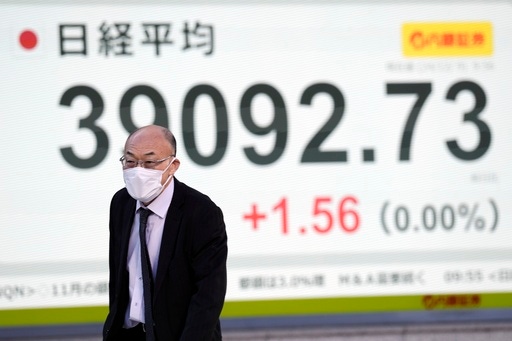Stock market today: Asian shares slide, with Korean benchmark down 2.5%, after Wall St hits records

A person walks in front of an electronic stock board showing Japan's Nikkei index at a securities firm Monday, Dec. 9, 2024, in Tokyo. (AP Photo/Eugene Hoshiko)[ASSOCIATED PRESS/Eugene Hoshiko]
BANGKOK (AP) — Shares were mostly lower Monday in Asia, with South Korea’s benchmark down 2.3%, after U.S. stocks closed out last week with more records.
The impact on world markets from the overthrow of Syrian leader Bashar Assad, who sought asylum in Moscow after rebels ended the Assad family’s 50 years of iron rule, remained unclear. Oil prices were mixed, while U.S. futures edged lower.
The political situation remained tense in South Korea as local media reported that the police were considering imposing an overseas travel ban on President Yoon Suk Yeol. Yoon’s status remained uncertain after he declared martial law last week in the midst of a budget dispute and then reversed that hours later.
The Kospi in Seoul dipped 2.3% to 2,372.02.
Chinese shares also fell, with Hong Kong’s Hang Seng down 0.6% at 19,753.26 and the Shanghai Composite index falling 0.4% to 3,390.62. Investors are awaiting a major economic planning meeting expected this week that will set the policy agenda for coming months, possibly bringing fresh stimulus for the world’s No. 2 economy.
Tokyo’s Nikkei 225 index edged 0.2% higher, to 39,161.10 as the Japanese yen gained against the U.S. dollar. The dollar was trading at 149.94 yen early Monday, down from 150.07 yen. Traders are increasingly expecting the Bank of Japan to raise interest rates to help counter the yen’s prolonged slump against the dollar and keep price increases under control.
In Australia, the S&P/ASX 200 fell 0.2% to 8,400.80. India’s Sensex edged 0.1% lower, while Taiwan’s Taiex gained 0.4%. In Bangkok, the SET was down 0.3%.
On Friday, U.S. stocks rose to records Friday after data suggested the job market remains solid enough to keep the economy going, but not so strong that it raises immediate worries about inflation.
The S&P 500 climbed 0.2% to 6,090.27, just enough to log another all-time high, closing a third straight winning week in what looks to be one of its best years since the 2000 dot-com bust. The Dow Jones Industrial Average dipped 0.3% to 44,642.52, while the Nasdaq composite rose 0.8% to set its own record of 19,859.77.
The jobs report strengthened traders’ expectations that the Federal Reserve will cut interest rates again at its next meeting in two weeks. It showed U.S. employers hired more workers than expected last month, but also said the unemployment rate unexpectedly ticked up to 4.2% from 4.1%.
The Fed has been easing its main interest rate from a two-decade high since September to offer more help for the slowing job market, after bringing inflation nearly all the way down to its 2% target. Lower interest rates can ease the brakes off the economy, but they can also offer more fuel for inflation.
The S&P 500 has set an all-time high 57 times so far this year.
For now, the hope is that the job market can help U.S. shoppers continue to spend and keep the U.S. economy out of a recession that had earlier seemed inevitable after the Fed began hiking interest rates swiftly to crush inflation.
Retailers overall have been offering mixed signals on how resilient U.S. shoppers can remain amid the slowing job market and still-high prices. Target gave a dour forecast for the holiday shopping season, for example, while Walmart gave a much more encouraging outlook.
A report on Friday suggested sentiment among U.S. consumers may be improving more than economists expected. The preliminary reading from the University of Michigan’s survey hit its highest level in seven months. The survey found a surge in buying for some products as consumers tried to get ahead of possible increases in price due to higher tariffs that President-elect Donald Trump has threatened.
In tech, Hewlett Packard Enterprise jumped 10.6% for one of the S&P 500’s larger gains after reporting stronger profit and revenue than expected. Tech stocks were some of the market’s strongest this week, as Salesforce and other big companies talked up how much of a boost they’re getting from the artificial-intelligence boom.
In other dealings early Friday, Bitcoin was sitting near $99,600 after bursting above $103,000 to a record the day before.
U.S. benchmark crude oil gained 31 cents to $67.51 per barrel in electronic trading on the New York Mercantile Exchange. Brent crude, the international standard, lost 7 cents to $71.05 per barrel.
The euro slipped to $1.0537 from $1.0561.
Copyright 2024 The Associated Press. All rights reserved. This material may not be published, broadcast, rewritten or redistributed without permission.